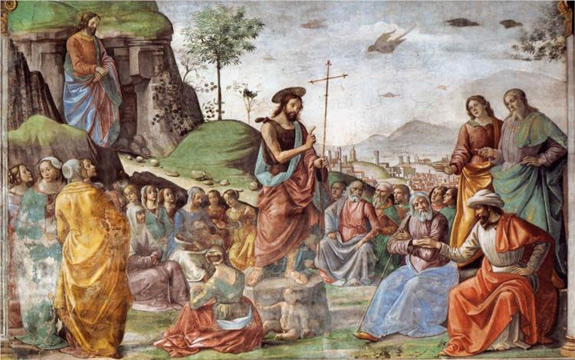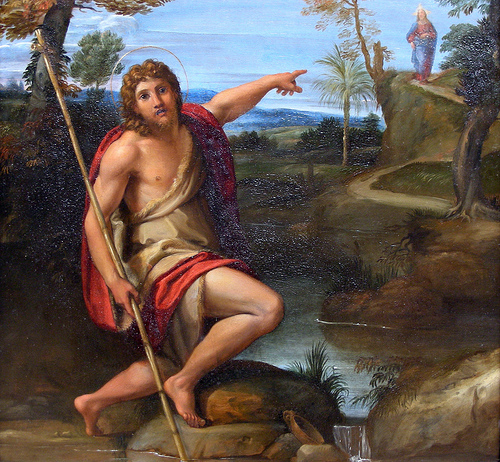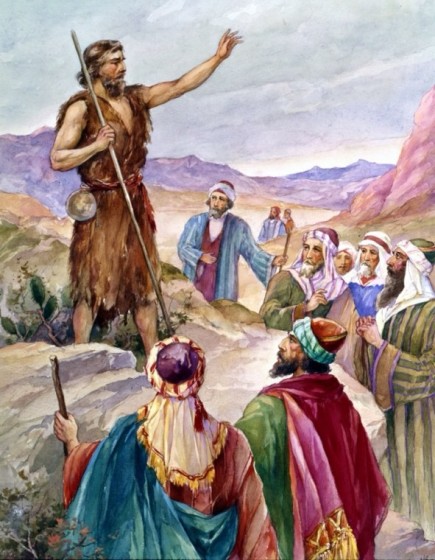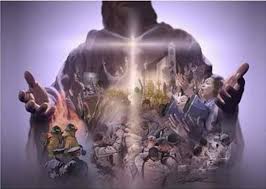
– 15th December 2024 –
Third Sunday of Advent -Year C
– Gaudete (Rejoicing ) Sunday-
Gospel Reading: Luke 3:10-18
vs.10 When all the people asked John, “What must we do?”
vs.11 he answered, “If anyone has two tunics he must share with the man who has none, and the one who has something to eat must do the same.”
vs.12 There were tax collectors too who came for baptism, and these said to him,
“Master, what must we do?”
vs.13 He said to them, “Exact no more than your rate.”
vs.14 Some soldiers asked him in their turn,
“What about us? What must we do?”
He said to them, “No intimidation! No extortion! Be content with your pay!”
vs.15 A feeling of expectancy had grown among the people, who were beginning to think that John might be the Christ,
vs.16 so John declared before them all,
“I baptise you with water, but someone is coming, someone who is more powerful than I am, and I am not fit to undo the strap of his sandals; he will baptise you with the Holy Spirit and fire.
vs.17 His winnowing fan is in his hand to clear his threshing floor and to gather the wheat into his barn; but the chaff he will burn in a fire that will never go out.”
vs.18 As well as this, there were many other things he said to exhort the people and announce the Good News to them.
*******************************************************
We have four commentators available from whom you may wish to choose .
Michel DeVerteuil : Holy Ghost Priest, director of a Centre of Biblical renewal in Trinidad W.I. .
Thomas O’Loughlin: Professor of Historical Theology, University of Wales, Lampeter.
Sean Goan: Studied scripture in Rome, Jerusalem and Chicago and teaches at Blackrock College, Dublin and works with the Le Chéile School.
Donal Neary SJ: Editor of The Sacred Heart Messenger and National Director of The Apostlship of Prayer.
General Comments
On the third Sunday of Advent St Luke gives us a glimpse into the personality of that wonderful person, John the Baptist. In your meditation, let him remind you of great people you have known.

In verses 10 to 14 John speaks openly. Notice how he has a different word for each group which questions him. Notice too how the soldiers feel that even they can get a word of salvation.
Verses 15 to 18 give us a further insight into the kind of person John the Baptist was. He may have said these words in a moment of discouragement, in which case they express his trust that God would complete what was lacking in his ministry. But perhaps they tell us of his humility in the midst of his extraordinary success as a preacher.
Scripture Prayer
“The bread you do not use is the bread of the hungry.” ...St Ambrose
Lord, we thank you for people who are direct and honest like John the Baptist.
When we ask them what we must do, they don’t beat around the bush but tell us openly:
those who have two tunics must share with those who have none, those with something to eat must do the same.
Lord, John the Baptist knew his people.
When the tax collectors came for baptism he told them exactly what they must do,
and so too with the soldiers.
Lord, we pray for the Church today.
“We all want to be famous people, but the moment we want to be someone we are not
we are no longer free.” ...Krishnamurti
Lord, give us the humility of John the Baptist.
When a feeling of expectancy grows
and our followers begin to think that we might be some kind of Messiah,
help us to declare before them all that we are merely baptising with water.
There is one who is more powerful than we are and he baptises with the Holy Spirit and with fire.
“We are a resourceful people but deadly scared of our own natively-inspired success.” …Clifford Sealey, Trinidadian poet
Lord, often we do not accomplish what we can because we are afraid of failure.
We must be content to baptise with water, trusting that someone will come after us who is more powerful than we are, and he or she will baptise with the Holy Spirit and with fire.
“Something happened between me and the earth. The land recognised me.” …Earl Lovelace Earl Lovelace is a major Caribbean writer, one of the few of his generation to have lived in and written almost exclusively from the region of Trinidad wrote this as he landed on African soil for the first time, November 1991.
Lord, we thank you for the moments of grace when we feel we are connected with the whole of creation and all of our history. We know then that your winnowing fan is in your hand, and that evil is merely chaff which you will burn in a fire that will never go out,
whereas we are your precious wheat which you will gather into your barn.
**************************************************
Thomas O’Loughlin,
Liturgical Resources for Year C (Luke)
www.columba.ie
Gospel Comment: Lk 3:10-1 8
T he figure of John the Baptist is seen as central to today’s liturgy and so we have this rarely read section from Luke. In all four gospels the work and preaching of the Baptist is seen as the divinely appointed preparation for the ministry of the Christ: Mt 3:1-12; Mk 1:1-8; Lk 3:1-19; and Jn 1:6-8.
he figure of John the Baptist is seen as central to today’s liturgy and so we have this rarely read section from Luke. In all four gospels the work and preaching of the Baptist is seen as the divinely appointed preparation for the ministry of the Christ: Mt 3:1-12; Mk 1:1-8; Lk 3:1-19; and Jn 1:6-8.
The presence of this precise theme preaching/ comparing all four gospels (distinguish from any other material they have on John the Baptist) show that this was a fundamental element in the kerygma: a partial hearing the Good News of the Paschal Mystery is that the Baptist has prepared the way. It is to maintain continuity with structural element of the preaching that it is part of our liturgy to recall, indeed celebrate, the ministry of the Baptist on the Second and Third Sundays of Advent in all three years of the lectionary cycle. If we are going to celebrate the beginning of the Christ- event in the festivals of the Nativity, Epiphany, and Baptism, then we must have celebrated the work of the Baptist beforehand.
Now that we have established the kerygmatic context of this gospel reading, we can look at the precise text in greater detail. Luke’s account of the preaching of the Baptist is by far the longest, and most of today’s passage is found only in Luke. The whole passage has as its central theme that the arrival of the Christ is at hand: he is already on earth and ready to pronounce judgement. The time of decision is not in some future time, but has started already for his ‘winnowing fork’ is in his hand. However, as part of the reaction to the presence of the Messiah — provoking this reaction from his hearers is the Baptist’s work of preparing the way — Luke has an ethical component: verses 10- 14 which are wholly without parallel in the gospel tradition.
If the axe is laid to the tree (v 9), then the people who want to prepare, ‘the multitudes,’ must now ask: ‘What then shall we do?’ The baptist’s replies cover
(1) everyone — they must care for the poor:
if the time of the Messiah is come there can be no one in need of clothing or food in the land;
(2) civic officials — injustice in society is irreconcilable in these times; and
(3) soldiers — there can be no exploitation now.
 This ethical dimension in Luke’s presentation shows that while the early Christians were holding up the Baptist as a model to the churches, they also considered moral behaviour an essential part of their discipleship. This ethical aspect of welcoming the Christ in this gospel should be a spring board to some searching questions of each community about its own work in society to create the justice worthy of the coming of the Lord. Such ethical questions about Christian obligations to establish the just society are often forced onto the gospel text, but today it emerges directly as an Advent theme.
This ethical dimension in Luke’s presentation shows that while the early Christians were holding up the Baptist as a model to the churches, they also considered moral behaviour an essential part of their discipleship. This ethical aspect of welcoming the Christ in this gospel should be a spring board to some searching questions of each community about its own work in society to create the justice worthy of the coming of the Lord. Such ethical questions about Christian obligations to establish the just society are often forced onto the gospel text, but today it emerges directly as an Advent theme.
Homily notes
1. During Advent we hear several basic elements of the Christian preaching over and over again in the liturgy:
 *Prepare a way for the Lord’;
*Prepare a way for the Lord’;
*The Lord is near‘;
*Repent and believe‘;
*The Lord will come again to judge the living and the dead’;
*We must be people of hope‘.
2. In the run-up to Christmas we hear around us several basic elements of the creed of the ‘consumerist‘ first-world:
*We need lots of stuff for the party’; *Always in a hurry to get to the shops’;
*Toys are so expensive – lucky that the credit card does not come due until January’;
*I am fed up with all the Christmas-hype’.
*We’re flying to Madagascar for the holidays’;
3. Two groups of five sound bites -and as sound bites we hear and use all ten of them – which are also tokens symptoms of two radically opposed lifestyles, belief systems, and visions of the universe.
4. The Christian vision involves, fundamentally, going out from the individual to the other people, society, the world in which we live, and God.
It involves radically challenging our selfishness and the belief that selfishness is the motor that makes the human world go round. We could imagine it as
a picture of myself with arrows pointing outwards,
then of our gathering for the Eucharist with arrows pointing outwards,
then of our society or the whole body of Christians and arrows pointing outwards from it.
5. The consumerist vision puts ‘me‘ at the centre of the universe and all the arrows point inwards:
have I got what I want for my happiness,
have I got what I desire, am I satisfied,
is there the amount of pleasure that I desire?
Others only become involved in that we pool our selfishness so that we can have more fun together. The arrows point inwards and it does not matter whose labour is exploited so that I can have what I want – that is over the horizon and hidden from me.
It is irrelevant if others do not have enough to eat, have poor health care, suffer in ignorance for want of proper education, that I consume more of the earth’s resources than whole villages in the developing world.
6. But:
Can we say that the Lord is near when we may contribute to a society that exploits the poor?
Can we rejoice in the Lord’s coming while we simply find things boring and seek new amusements but at the same time know that there are people in society who are in want?
Can we claim to be preparing the way of the Lord while children die of malnutrition, while whole societies in sub-Saharan Africa and Gaza and the Ukraine are devastated by AIDS malnutrition suffering without the right drugs/food/ or vacines plentiful in other richer countries?
Can we rejoice in the Lord’s coming while we simply find things boring and seek new amusements but at the same time know that there are people in society who are so much in want?

Highway maintenance workers clear the road of winter snow in Canada
In Advent, are we really trying to prepare the way for the Lord?
6. Preparing a way for the Lord is simple, indeed can be bit of fun, if it is just putting up the holly, doing the shopping, and maybe popping along to a Carol Service:
………..Surely it should be much more than that?….
Sean Goan:
Let the reader understand
www.columba.ie
Gospel
From now until after Christmas we leave Mark’s gospel, but nonetheless for today the focus remains on John the Baptist. As in Mark, John’s gospel has no story of the birth of Jesus but right from the outset it emphasises the divine origin of Jesus, the light of the world, the Word  made flesh. The role of the Baptist is to bear witness to who Jesus really is and that is what we see in the text for today. John always directs the focus away from himself and points to the one who is coming, and once again the quotation from Is 40 is heard. The level of expectation is high, as can be seen from the questions being put to John but his only interest is pointing the way to Jesus and that makes him a perfect role model for Advent.
made flesh. The role of the Baptist is to bear witness to who Jesus really is and that is what we see in the text for today. John always directs the focus away from himself and points to the one who is coming, and once again the quotation from Is 40 is heard. The level of expectation is high, as can be seen from the questions being put to John but his only interest is pointing the way to Jesus and that makes him a perfect role model for Advent.
Reflection
 In the gospel John the Baptist describes Jesus as ‘standing among you, unknown to you‘.
In the gospel John the Baptist describes Jesus as ‘standing among you, unknown to you‘.
In John’s time this was because Jesus had not yet begun his ministry, but in our own day these words have a particular relevance. We live by faith in Jesus the crucified and risen Lord present in our world. In preparing for Christmas we want to renew our awareness of that presence and to help others be aware of it. In Advent we, like John, are called to be witnesses to the light he brings. In small but important ways we can bring light into the lives of those around us. Simple acts of kindness, sharing our time, talents or resources with those in need, is the only way Christ’s light will shine for many people this Christmas. In our time, through the gift of the Spirit, the Word becomes flesh in us.
*******************************
Donal Neary SJ
Gospel Reflections
www.columba.ie
Brings Out Our Best

This mid-point of Advent alerts us to issues of justice and equality.
The prophet John has been asked as a sort of trick by people who exploited others with tax bills, and soldiers who often used their brute force on others how they should repent. His words were tough but quite ordinary –
~ don’t overcharge, ~ share your surplus with the needy ~ and don’t exploit people.
It’s another, but more figurative way, of stating the basic demands of ‘Love one another‘.
Christmas can bring out the best in us to care for the needy. We are surrounded by charities looking for aid. We know that Jesus hears the cries of the poor, and he joins every carol singing group trying to help.
Christmas also asks us to consider our honesty and integrity, for we know that many are poor, at home and abroad, because of the greed of others.
Christmas is a reminder and a challenge that all can live with the dignity we have come to regard as human rights – education, safety, shelter, food, water, employment, freedom.
The Christ child who was born poor represents all the poor of the world, especially children. As he was born ordinary, he represents that God who meets, greets and helps us in the ordinary aspects of life. The one who is to come is the one who will live and love according to these truths of human dignity and equality.
Come, Lord Jesus, child of the earth, child of God.
Come into our world of joy and sorrow.
Stay with us always,
now and at the hour of our death. Amen.
******************************************